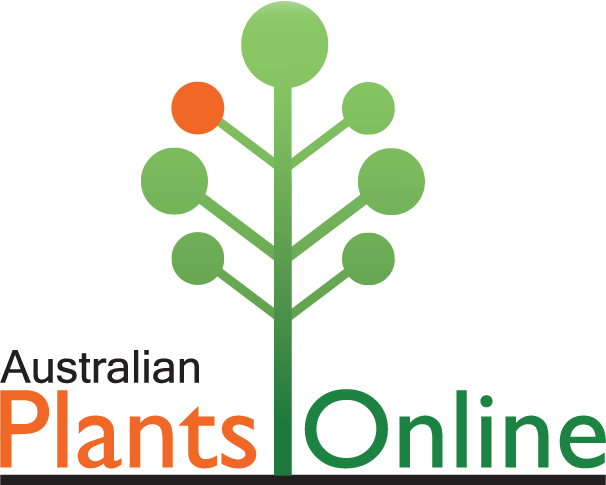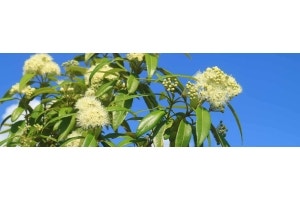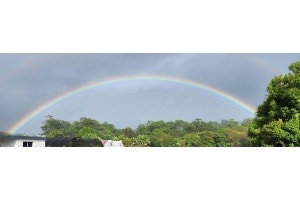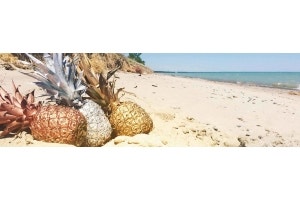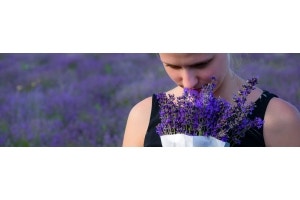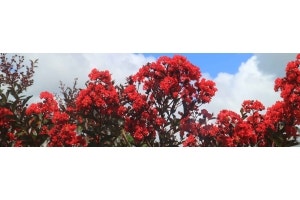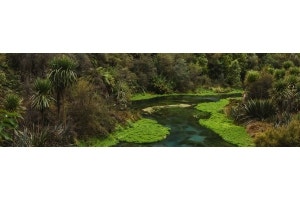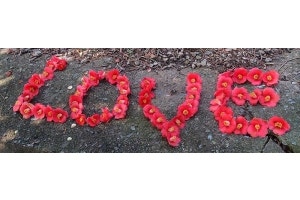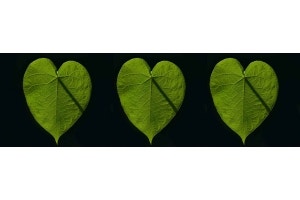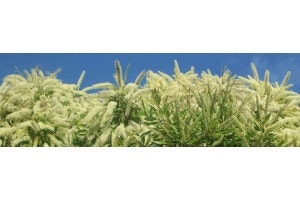
Occasionally we get emails and social media comments saying that a certain plant we sell "is a weed". It isn't.What this usually means is :
a) the plant species has a tendency to spread if poorly managed.
We do not sell the species, we sell a well-behaved, often sterile, cultivar, which is different or b) the plant species is thriving in small localised areas, and endemic plants may be challenged as a result.
Being a weed in one place does not make it a weed everywhere.or c) the plant is not native to Australia.
Being non-native does not make a plant a weed. And being native does not stop a plant being a weed - as we will discover... So what is a "weed"?
So what is a "weed"?
For some people, it might be a cultivated garden plant in a wild area.
For others, it's a wild plant in a cultivated garden.
 In some locations, and some climates, certain plants have the potential to become troublesome, Perhaps they grow too well in certain climates and soils; or they may threaten to spread into fragile areas of bushland that are being protected. Sometimes this potential is only after extreme climate events such as fire, flood, or drought. A state may decide to place them on a Declared Weed list. Steps may be taken to actively control these plants, such as their removal from wild spaces in that specific local area.
In some locations, and some climates, certain plants have the potential to become troublesome, Perhaps they grow too well in certain climates and soils; or they may threaten to spread into fragile areas of bushland that are being protected. Sometimes this potential is only after extreme climate events such as fire, flood, or drought. A state may decide to place them on a Declared Weed list. Steps may be taken to actively control these plants, such as their removal from wild spaces in that specific local area.
We can sell them legally to any gardener outside that state.
Then it is up to individual gardeners to decide whether to plant it.
You can plant and enjoy them in all other states and territories.
Hedera helix is a declared weed in ACT and WA.

We sell Berberis thunbergii, a different species.
The blackberry we sell is R. allegheniensis, or the cultivar R. ulmifolius Chester, which is permitted for fruit growing.
We sell C. racemosa nana, a different species.
This is NOT the Pittosporum we sell, which is P tenuifolium, a different species.
This is NOT the Ligustrum we sell, ours is L. undulatum - not an invasive privet.
But without that wild white carrot - first brought to Sydney to feed the new colony in 1786 - we'd have no orange carrots on our plates today. If you are in doubt, please check your own state's agriculture or environment website for information specific to your local area.
If there is a plant not on this list that you believe is a weed , please contact Weeds Australia at weeds@invasives.com.au
If you are in doubt, please check your own state's agriculture or environment website for information specific to your local area.
If there is a plant not on this list that you believe is a weed , please contact Weeds Australia at weeds@invasives.com.au
We do not sell the species, we sell a well-behaved, often sterile, cultivar, which is different or b) the plant species is thriving in small localised areas, and endemic plants may be challenged as a result.
Being a weed in one place does not make it a weed everywhere.or c) the plant is not native to Australia.
Being non-native does not make a plant a weed. And being native does not stop a plant being a weed - as we will discover...
 So what is a "weed"?
So what is a "weed"?
The definition of a weed is a plant in the wrong place, where it is not wanted. For most people, it's a seedling poking through the cracks between the paving.
For some people, it might be a cultivated garden plant in a wild area.
For others, it's a wild plant in a cultivated garden.
Some so-called weeds in the right situation are highly valuable plants - for animal feed, for feeding beneficial pollinators, for erosion control, for biodiversity and wildlife preservation. Like these lawn clovers - weed, or bee feed?
Weeds In Summary (or tl;dr):
- All the plants we sell are legally-allowed garden plants.
- Australian Plants Online does not sell any Weeds of National Significance (see below)
- Some plants may be restricted for sale in certain states and territories. We abide by those states' legislation.
- Plants restricted for sale in certain states are perfectly legal to sell and grow in the rest of the country.
- Some plants might have the potential to be weeds in specific localised areas. That does not mean they have that potential elsewhere; nor are they generally restricted for sale or garden use.
- If in doubt, check with your local/regional authority for more information specific to where you live.

Weeds of National Significance
The Australian government maintains a list of 32 plants that should not be planted in Australia. If possible, these plants should be removed and destroyed when found. These are Weeds of National Significance. They include : lantana Lantana camara; asparagus ferns Asparagus aethiopicus; Asparagus asparagoides; Asparagus declinatus; all Salix willow except S babylonica, S x calodendron, S x reichardtii; and water hyacinth Eichhornia crassipes.Note that the botanic names are very specific to particular species and subspecies.
It doesn't mean that all members of that plant genus are weeds - just as your cousin being in jail doesn't make you a criminal. That's just one of the reasons that here at Australian Plants Online we use the full name - genus, species, cultivar - in our plant descriptions, so you can be sure of exactly what you are getting and growing.
Regional Potential Weeds
 In some locations, and some climates, certain plants have the potential to become troublesome, Perhaps they grow too well in certain climates and soils; or they may threaten to spread into fragile areas of bushland that are being protected. Sometimes this potential is only after extreme climate events such as fire, flood, or drought. A state may decide to place them on a Declared Weed list. Steps may be taken to actively control these plants, such as their removal from wild spaces in that specific local area.
In some locations, and some climates, certain plants have the potential to become troublesome, Perhaps they grow too well in certain climates and soils; or they may threaten to spread into fragile areas of bushland that are being protected. Sometimes this potential is only after extreme climate events such as fire, flood, or drought. A state may decide to place them on a Declared Weed list. Steps may be taken to actively control these plants, such as their removal from wild spaces in that specific local area.
We do not sell ANY plant that is listed on an individual state's Declared Weed List to residents of that state.
We can sell them legally to any gardener outside that state.
We advise on the product page if a plant is not suited for gardens close to bushland or protected reserves, to avoid spread into neighbouring bushland.
Then it is up to individual gardeners to decide whether to plant it.
We also offer alternatives or sterile cultivars of the plant in those situations, and advise on ways to manage the plant (eg deadheading, regular clipping), which gardeners can be guided by if they choose.

State Weeds
Some individual states restrict the sale of certain plants to prevent the potential of spread occurring outside gardens into wild areas. We monitor these state plant lists regularly and update our shipping restrictions accordingly. Sometimes that means restricting shipping a plant to a specific state, sometimes it means a state has lifted the restrictions and shipping is allowed.Beyond that, the responsibility lies with the landowner or householder to :- monitor and manage the plants in their own garden
- dispose of unwanted plant material responsibly
- and to be aware of any restrictions in their own local area.
If plants are Restricted or Declared weeds in one state or territory, we don't ship them there.
You can plant and enjoy them in all other states and territories.
Cootamundra wattle - this beautiful native, Acacia baileyana, is resilient and hardy, flowering from a young age - making it beloved and popular with gardeners. Too resilient in ACT, where its sale is restricted. That's why we don't ship it there. It hybridises easily with other native wattles like silver wattle Acacia dealbata and black wattle Acacia decurrens. These species are also potentially problematic in some specific areas. A reminder that just because a plant is native, doesn't mean it's ok to plant everywhere!
Gazania - bright daisies that love the Aussie sunshine, flower generously, and thrive in dry poor soils. Which makes them fantastic garden plants, unless you live in South Australia where they are a declared weed, having made themselves at home a little too much.
English ivy - an invaluable garden plant for gardeners in tough, challenging environments, and those who like to support wildlife. English ivy is fast-growing and will grow in shade, and provides shelter and housing for a wide range of insects and small birds, which many gardeners appreciate. On our product pages we alert gardeners that the plant will root along its stems. Grown in a hanging basket, or over a wall, it will be well behaved and controlled. Uprooted stems should always be responsibly disposed of.
Hedera helix is a declared weed in ACT and WA.
Italian Lavender - Lavandula stoechas - one of the most popular garden plants we sell - is listed as having the potential to become a weed in specific locations, where the climate is right and soil is poor or disturbed. It is a Restricted weed in some areas of VIC, but not all areas. If you live in VIC, we can legally ship it to you. The responsibility is with you to decide whether you pant it or not.Other species of lavender - French, English, spike lavender - are NOT restricted at all.
Olive - very popular as an ornamental tree for the lovely silvery foliage, Olea europaea, the European olive, thrives in the Mediterranean climate of the southern states. We sell named cultivars of olive, Manzanilla and Kalamata. Wilding or feral olives are a declared weed in SA where they appear in bushland. The SA government states "A distinction is made between olive trees that were deliberately planted and are used and maintained and wilding olives, defined as 1) feral olives that have grown from self-sown seed; or 2) olive trees that are no longer used and/or maintained such that they pose a high risk of giving rise to feral olives." You can garden with olives in SA, if you plant named cultivars like the ones we sell, and if you maintain them.

Not Weeds
These garden plants are not Weeds of National Significance, nor a declared weed in any state of Australia.Agapanthus - an invaluable garden plant for gardeners in tough, challenging environments; and its fire-resistant qualities are useful. In optimal conditions, the plant can become too successful and edge out other plants. On our product pages we recommend deadheading agapanthus after flowering to remove the chance of self seeding, in these situations; and we sell sterile varieties. The government's website says that initial spread of the plants "is normally by dumping of garden material or seed" - so responsible behaviour by gardeners is a good step towards control.
Gaura - also known as Oenothera lindheimeri, is one of our most popular recent introductions, and widely grown as a garden plant for its beauty and resilience. It might spread in areas of disturbed ground, where it is sandy. Cutting the plant back after flowering removes this possibility.
Murraya - this evergreen fragrant hedging plant is not listed anywhere on the Weeds Australia website as either a declared weed, an alert plant, or a sleeper weed. It is legal to plant, and is one of the most popular plants we sell. We sell cuttings-grown plants, NOT seed-grown.
Vinca major - an invaluable garden plant for gardeners in tough, challenging environments. Vinca is fast-growing and will grow and flower in shade, which many gardeners value. On our product pages we alert gardeners that the plant will root along its stems; grown in a hanging basket or over a wall, it will be well behaved and controlled. Uprooted stems should always be responsibly disposed of.

Not To Be Confused With Weeds
As we say at the start, your cousin being in jail doesn't make you a criminal too. Botanic names are very specific to particular species. And different species from the same genus do not always share the same behaviours.Berberis - a vibrantly-coloured, rugged, attractive hedging plant, this genus is rightly popular with gardeners. Berberis darwinii may have potential to be a weed where it is spread by birds eating the berries. It is a declared weed in TAS.
We sell Berberis thunbergii, a different species.
Blackberry - Rubus fruticosus aggregate is the one on the Weeds of National Significance list, and as the government website points out, "Care is needed not to impact on the Blackberry fruit industry as well as native species of Rubus", and identification "can only be determined with confidence if material of both primocanes and floricanes is present".
The blackberry we sell is R. allegheniensis, or the cultivar R. ulmifolius Chester, which is permitted for fruit growing.
Broom - Spanish broom Cytisus multiflorus is proving problematic in small localised areas of VIC.
We sell C. racemosa nana, a different species.
Pittosporum - PIttosporum undulatum is native to the east coast of Australia, yet also has weed potential here, as the berries are attractive to birds, which spread the seeds within. It is a declared weed in ACT NSW QLD and WA.
This is NOT the Pittosporum we sell, which is P tenuifolium, a different species.
Privet - Ligustrum lucidum and Ligustrum sinense have weed potential in subtropical areas of high rainfall, as the berries are attractive to birds, which spread the seeds within. At least one species is a declared weed in ACT NSW QLD VIC and WA.
This is NOT the Ligustrum we sell, ours is L. undulatum - not an invasive privet.
Carrot - yes, Daucus carota, the humble carrot, is listed as a potential weed on the government site. It applies to the wild species, not cultivars for vegetable growing - another reason for being very clear about the exact plants referred to as "weeds".
But without that wild white carrot - first brought to Sydney to feed the new colony in 1786 - we'd have no orange carrots on our plates today.
Weed Action
In a well-maintained garden, in a challenging environment, in an urban balcony, a garden plant is extremely unlikely to become a weed. In many cases, the resilience of plants that are disparaged as 'weeds' makes them valuable garden plants for many gardeners. The main type of weed-potential plants tend to be grasses; they have evolved to spread their seeds over a wide area, using light fluffy seeds that float far. If you are in doubt, please check your own state's agriculture or environment website for information specific to your local area.
If there is a plant not on this list that you believe is a weed , please contact Weeds Australia at weeds@invasives.com.au
If you are in doubt, please check your own state's agriculture or environment website for information specific to your local area.
If there is a plant not on this list that you believe is a weed , please contact Weeds Australia at weeds@invasives.com.au
